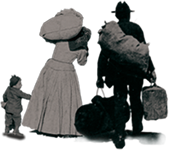The teaching of history is changing in meaning all over the world, and particularly in Europe. To the approach naziocentric still tenaciously entrenched at the heart of prevailing education in several countries, it is necessary to replace that approach multiprospective e pluralist o multidimensional, fundamental to building learning that is meaningful for school classes in which the presence of non-Italian speaking pupils - who speak Italian as a second language - poses this new educational and cognitive challenge. A challenge that is at the same time a great opportunity to build a new approach in which cultural identities are presented as processes in the making and not as immovable entities, always equal to themselves and closed toward any form of dialogue, closed, that is, toward any real interculturality.
The comparisons and clashes between cultures, the exchanges between civilizations, the mobility of men and ideas are essential themes for rereading the past in the light of the present and the needs of the future; they are the cipher in the light of which-it is now clear-the 21st century will have to reread its own history and the histories taught will have to be reshaped .
The mobility of men (which is not reducible to a simple displacement of labor power) is an essential theme for enhancing this new approach to the past: the paradoxes of otherness, the reality-often ignored-of cultural interactions, and the ways in which cultural identities are constructed can be read through a historical rereading that aims to educate to a strong idea of tolerance, reciprocity, dialogue and responsibility, using in the intercultural perspective what has been an element of division and conflict.
Retraining, in our school, the history taught essentially means re-motivating children's learning. And to remotivate learning essentially means to innovate radically, that is, to adapt canons, narrative paradigms, methodologies, working tools. And thus first of all enhancing human resources, the only leverage that teachers (not only those of historical disciplines) have to help rebuild their professional dignity.
With these intentions, in this section of the site, we offer materials that can be used as a source of study and reflection but also proposals for structured educational workshops
Umberto Baldocchi - Education Coordinator

